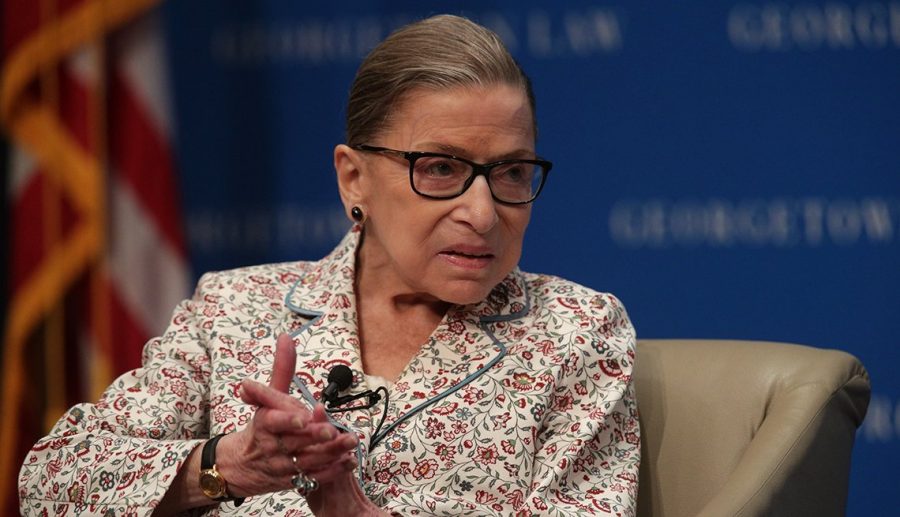The Life and Legacy of Ruth Bader Ginsburg
On September 18th, the world was stunned by the death of Ruth Bader Ginsburg. She was one of nine Supreme Court justices and fought for gender equality. Source of picture: AARP
October 14, 2020
Justice Ruth Bader Ginsburg was a pioneer of women’s and human rights, Supreme Court justice, and an overall amazing person. She worked throughout her career to advance the rights of women and minorities everywhere. Her extensive work progressing equality is something that continues to shape the country. Despite her national impact, on Sept. 18th, she passed away from pancreatic cancer at 87.
IB sophomore, Toni Curry, said Ruth Bader Ginsburg “opened many doors that we couldn’t open on our own” throughout her entire career.
Despite her current status as a cultural icon, Ginsburg struggled to find work because she was a woman early in her career. She attended public school and excelled both academically and as a baton twirler, encouraged by her mother. She then attended Cornell on a full scholarship, graduating at the top of her class. After Cornell, she married Martin Ginsburg. She scored extremely well on her civil service exam, but she could only get a job as a typist, which she lost when she became pregnant. Two years later, the family moved East to Harvard Law School. Ginsburg was only one of 9 women in her class, and the dean even asked her why she was taking up a man’s place. Shortly after, her husband was diagnosed with testicular cancer. While caring for her toddler and husband, Ginsburg worked her way through law school and wrote her husband’s papers that he dictated to her. After graduating, her husband got a job in New York City, and transferred to Colombia, graduating at the top of her class. Despite her academic achievements and prowess, career opportunities were closed to women, especially mothers.
A mentor, Gerald Gunther, finally got her a clerkship for Judge Edmund Palmieri. She worked for him for the next two years, and in 1963 got a job teaching at Rutger’s law school, where she began fighting gender discrimination. Ginsburg fought gender discrimination by fighting individual cases because she understood that United States courts would not rule in favor of women in a large decision. This tactic followed her through her entire legal career, starting with her first case. Her first major case followed a Colorado law that barred Charles Moritz from taking a tax deduction for taking care of his ailing mother because the deduction only applied to women or widowers. Her solution: make the statute apply equally to both sexes, and she won in the lower courts.
Then she took on the case Reed v. Reed. Sally Reed thought she should have been the executor of her son’s estate, not her ex-husband, but the written law automatically prefered men. Ginsburg took this case to the all-male Supreme Court, where they ruled that this law was unconstitutional. This was the first time the Supreme Court struck down a state law because of gender discrimination.
She continued the fight for gender equality with minor cases like this. In 1980, Jimmy Carter appointed Ginsburg to the US Court of Appeals for the District of Columbia.
Her final appointment occurred in 1993 when Bill Clinton appointed her to the Supreme Court. After her friendly confirmation hearings, she became the first Jewish woman to serve on the Supreme Court. She continued to rule in favor of equality throughout her entire tenure.
In 1996, Ginsburg wrote the 7-1 decision in United States v. Virginia, which ruled that the state-funded Virginia Military Institute had to admit women. She took center stage writing excellent Supreme Court opinions, such as those in Burwell v. Hobby Lobby, Ledbetter v. Goodyear, Lawrence v. Texas. In these cases, she supported women’s rights to birth control, equal pay, and LGBTQ+ rights by declaring sodomy laws unconstitutional.
Armitha Gagganapally, an IB sophomore, said she “admired her dedication to defending women’s rights and LGBTQ+ rights,” which these cases demonstrate.
Ginsburg, despite battling cancer multiple times, rarely missed oral arguments in her entire time on the Supreme Court. Eventually, cancer sadly did end her life, and the Trump administration and Senate Republicans immediately jumped to fill her seat right before the 2020 election.
Gagganapally found the actions of the Republicans to be “rude and disrespectful” towards Ginsburg’s memory.
It was established in 2016 when former president, Barack Obama, was blocked by the Senate to nominate Merrick Garland because it was an election year. However, the current Senate hypocritically wants to go through with the nomination process despite it being only a few months away from the election. There will be no way to tell what will happen in the coming weeks, but there is much to be seen.





















